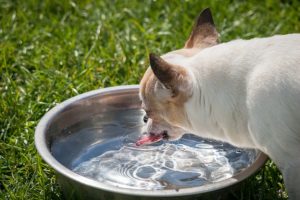
Keep yours dogs and cats cool during outdoor activities with these tips!
Maryland in July is perhaps the hottest time of year! Pets, such as cats and dogs, react to heat and humidity a little differently than people do and can be more susceptible to it. Help your pets beat the heat this year with these helpful tips!
Adjust Your Walks
If you can, walk in the coolest parts of the day, such as the morning and the evening. You could check the weather report to see when the temperature is most likely to rise and drop per day. If it is still hot and muggy when you take your rounds, limit the walk to prevent over-exhaustion. Another tip is to feel the pavement with your palm. If it feels hot, it’s hot for your dog to walk on. If possible, walk your dog on the grass instead.
Provide Shade Outdoors
If your cat or dog stays outside for any time in the summer, make sure there is a shady spot for them. A shade feature that provides ventilation is best, as enclosed spaces incubate heat and make it worse. A shade tree or tarp are just two ways to provide adequate shade.
Cool Them on the Inside
In addition, set out fresh water for your pet when it is outside. On particularly hot days, you can add a few ice cubes. The summer is also a great time to try out some homemade, frozen dog or cat treats that will both cool and nourish your pet.
Mind the Humidity
Remember that humidity is also a factor in whether to extend your walks or time outside or not. High humidity can make it more difficult for animals to cool down. For instance, dogs pant to help moisture in their lungs evaporate. Without the ability to do this, a dog’s temperature can skyrocket to dangerous levels.
Never Leave Pets in Cars
You’ve likely heard it before, but if not, take heed to never leave your pet in the car. Even if it is a mildly warm day, the temperature inside a vehicle can easily and quickly reach well over 100 degrees. It is best to leave your pet at home or with a pet-sitter if you cannot take it with you into the building.
Watch for Heatstrokes
Lastly, know the signs of heatstroke for your cat or dog. Heatstroke can include panting, salivating, a rapid heartbeat, dizziness, lethargy, confusion, vomiting, and unconsciousness. Some cats will pace when overheated. If you notice your cat or dog is having a heatstroke, immediately move it over to a cool and shady place and wash cool water over it or place cool towels on its head, neck, and chest. Then take your pet to the vet.
Trust the Care of Your Pet to the Professionals at Everhart Veterinary Medicine!
At Everhart Veterinary Medicine, our veterinary professionals strive to provide your pet with the very best of veterinary care. We believe that the best care for your pet should be provided by experienced, compassionate, and knowledgeable veterinary professionals. With two Maryland locations in both Baltimore and Pasadena, we are always ready to welcome your pet as a new patient! Give us a call today at 410-355-3131 or 410-793-7670! For more information, as well as updates on veterinary news and topics, visit us on Facebook, Twitter, or LinkedIn!
